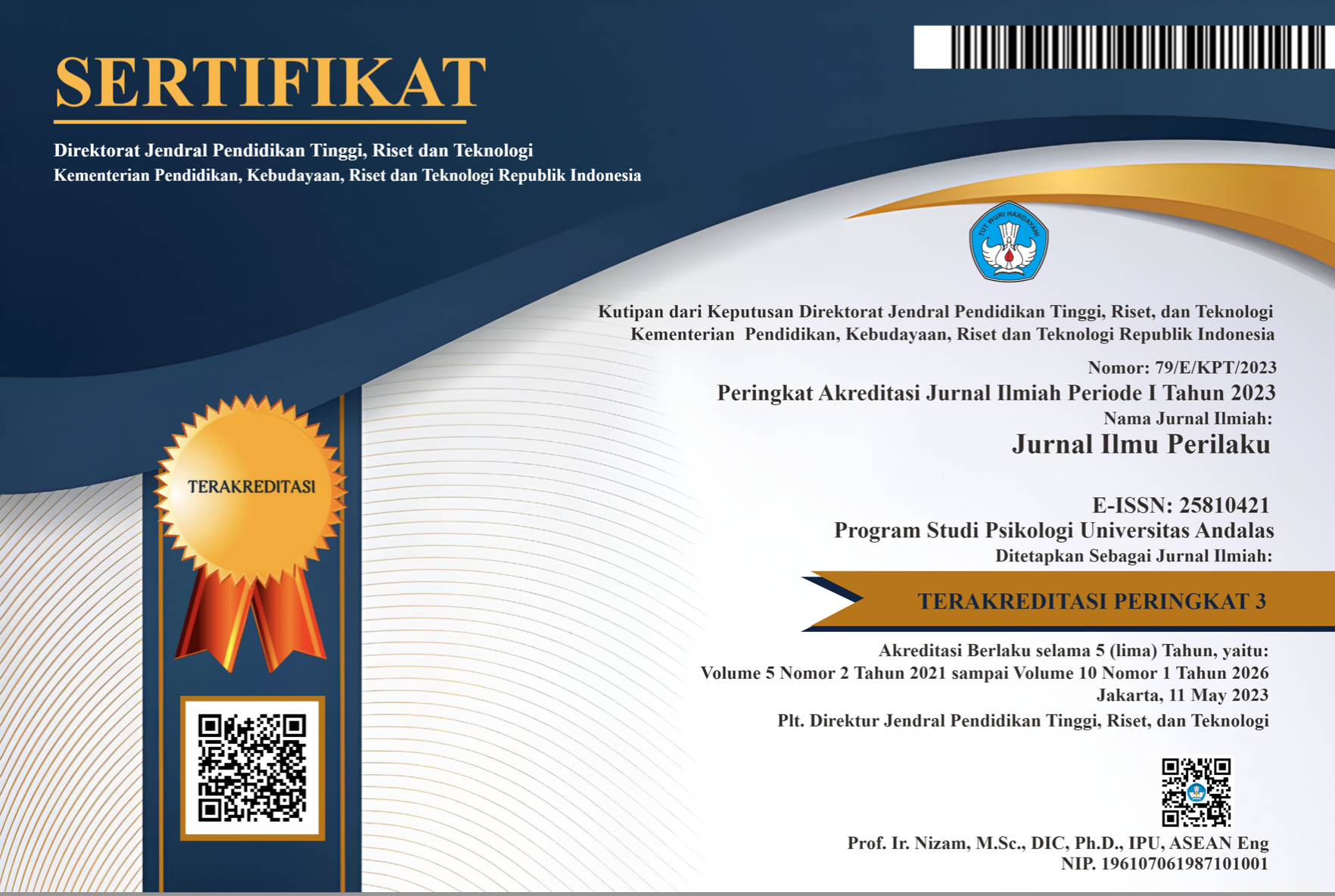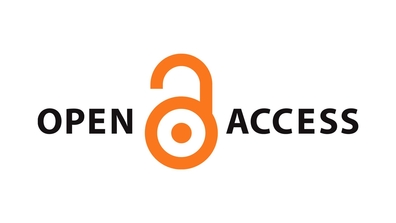Pengasuhan di Masa Early Childhood: Fathering Self Efficacy dan Parenting Stress pada Ayah yang Memiliki Anak Lebih Dari Satu
Abstract
Abstract. Fathers who have more than one child with an early childhood age range will face greater care demands, especially with the condition of the working mother in the family. The level of fathering self-efficacy plays an important role for father’s performance that is displayed, and has an impact on the stress that fathers experienced when undergoing parenting. This study aims to know the correlation between fathering self-efficacy and parenting stress. This study used a quantitative approach. Data were collected from 102 participants with age range 25-49 years old in Jabodetabek using the Fathering Self Efficacy Scale and Parenting Stress Scale The results showed that there was a significant negative relationship between fathering self-efficacy and parenting stress on fathers who had more than one child. This showed that a father does not perceive challenges in parenting as stressors when he has efficacy in parenting
Keywords: early childhood, fathers, fathering self-efficacy, parenting stress
Abstrak. Ayah yang memiliki anak lebih dari satu dalam rentang usia masa kanak-kanak awal akan menghadapi tuntutan pengasuhan yang lebih besar, terutama dengan adanya kondisi ibu bekerja di dalam keluarga. Tingkat keyakinan diri yang dimiliki oleh ayah dalam menjalani pengasuhan memegang peranan penting bagi performa yang ditampilkan, dan berdampak pada tekanan yang dialami ketika menjalani pengasuhan. Tujuan penelitian ini untuk melihat hubungan antara fathering self-efficacy dan parenting stress. Penelitian ini menggunakan pendekatan kuantitatif. Data yang dikumpulkan melibatkan 102 partisipan dengan rentang usia 25-49 tahun di Jabodetabek dengan menggunakan skala Fathering Self Efficacy dan skala Parenting Stress. Hasil penelitian menunjukkan bahwa terdapat hubungan negatif yang signifikan antara fathering self-efficacy dan parenting stress pada ayah yang memiliki anak lebih dari satu. Hal ini menunjukkan bahwa seorang ayah tidak menilai tantangan dalam pengasuhan sebagai stressor ketika memiliki keyakinan terhadap kemampuannya dalam pengasuhan.
Kata kunci: masa kanak-kanak awal, ayah, fathering self-efficacy, parenting stress
Downloads
References
Astriamitha. (2012). Hubungan antara parenting stress dan parenting self- efficacy pada ibu yang memiliki anak dengan tunagrahita taraf ringan dan sedang di usia kanak-kanak madya. Skripsi. Depok: Universitas Indonesia.
Astuti, V., & Masykur, A. M. (2015). Pengalaman keterlibatan ayah dalam pengasuhan anak (Studi kualitatif fenomenologis). Jurnal Empati, 4(2), 65-70.
Berry, J.O., & Jones, W. H. (1995). The parental stress scale: Initial psychometric evidence. Journal of social and personal relationship, 12(3), 463-472. Doi: 10.1177/0265407595123009
Bigner, J. J. & Gerhardt, C. (2013). Parent-Child Relations: An Introduction to Parenting (9th Ed). New Jersey: Prentice Hall.
Brooks, J. (2013). The Process of Parenting (9th Ed). Boston: McGraw-Hill.
Crnic, K., & Ross, E. (2017). Parenting stress and parental efficacy. Parental stress and early child development: Adaptive and maladaptive outcomes.
Deater-Deckerd, K., & Panneton, R. (ed). Switzerland: Springer International Publishing.
Cronin, S., & Becher, E. H. (2015). Parents and Stress: Understanding Experiences, Context, and Responses. Children, Youth, & Family Consortium. Minnesota: University of Minnesota.
Daulay, N. (2016). Kajian psikologi lintas budaya tentang stres pengasuhan pada ibu. Jurnal Tarbiyah, 2(23), 296-323. doi: 10.30829/tar.v23i2.115
Deater-Deckerd, K. (2004). Parenting Stress. London: Yale University Press.
Duvall, E. R. M. (1985). Marriage and Family Development (6th Ed). Philadelphia: J.B. Lippincott.
Giallo, R., D'Esposito, F., Christensen, D., Mensah, F., Cooklin, A., Wade, C., Lucas, N., Canterford, L., & Nicholson, J. M. (2012). Father mental health during the early parenting period: results of an Australian population based longitudinal study. Social psychiatry and psychiatric epidemiology, 47(12), 1907–1916. doi: 0.1007/s00127-012-0510-0
Gouveia, M. J., Carona, C., Canavarro, M. C., & Moreira, H. (2016). Self compassion and dispositional mindfulness are associated withparenting styles and parenting stres: the mediating role of mindfulparenting. Mindfulness, 7(3), 700-712. doi: 10.1007/s12671-016-0507-y
Gravetter, F. J., & Wallnau, L. B. (2013). Statistics for The Behavioral Sciences (9th Ed). California: Wadsworth.
Jannah, M. (2015). Tugas-tugas perkembangan pada usia kanak-kanak. Gender equality: International journal of child and gender studies, 1(2), 87-98.
Kumalasari, D., & Gandi, I. A. A. (2020). Mengasuh anak usia prasekolah vs anak usia sekolah dasar: Manakah yang lebih menimbulkan stres pengasuhan pada ibu?. Jurnal Personifikasi, 11(2), 146-160.
Kwan, R. W., Kwok, S. Y., & Ling, C. C. (2015) The moderating roles of parenting self-efficacy and co-parenting alliance on marital satisfaction among Chinese fathers and mothers. Journal Child Family Study, 3506-3515.
Lamb, M. E. (2010). The Role of The Father in Childhood Development (5th Ed). New Jersey: John Wiley & Sons, Inc.
Li, X., & Meier, J. (2017). Father love and mother love: Contributions of parental acceptance to children’s psychological adjustment. Journal of Family Theory & Review, 9. 459-490.
Nugrahani, H. Z., Salim, R. M. A., & Saleh, A. Y. (2021). Gambaran keterlibatan ayah dalam pengasuhan anak usia dini: Baseline dari rancangan program intervensi untuk ayah. Provitae: Jurnal Psikologi Pendidikan, 14(1), 42-58.
Oates, J. (2010). Supporting Parenting: Early Childhood in Focus (5th Ed). Milton Keynes: The Open University.
Papalia, D.E., Olds, S.W., & Feldman, R.D. (2013). Human Development. New York: McGraw-Hill.
Parmanti, & Purnamasari, S. E. (2015). Peran ayah dalam pengasuhan anak. InSight, 17(2), 81-90. ISSN: 1693-2552.
Parung, G. E., & Ferreira, N. (2017). Work-life balance, couple satisfaction, and father involvement: A cross-cultural study. Anima Indonesian Psychological Journal, 32(4), 201-216.
Santrock, J. W. (2019). Life-Span Development (17th Ed). New York: McGraw-Hill Companies, Inc.
Sevigny, P. R. (2013). Understanding parental self-efficacy in fathers. Thesis. Kanada: University of Regina.
Sevigny, P. R., Loutzenhiser, L., & McAuslan, P. (2016). Development and validations of the fathering self-efficacy scale. Psychology of Men & Masculinity, 17(1), 92-102.
Solem, M.-B., Christophersen, K.-A., & Martinussen, M. (2011). Predicting parenting stres: children’s behavioural problems and parents’ coping. Infant and Child Development, 20(2), 162–180. doi: 10.1002/icd.681
Utomo, I. D., Reimondos, A., Utomo., A. J., McDonald, P., & Hull, T. H. (2011). Life situations of young fathers in greater jakarta.
Wahyuningrum, E. (2014). Peran ayah (fathering) pada pengasuhan anak usia dini (sebuah kajian teoritis). Psikowacana, 10, 1-19.
Wakschlag, L.S., Henry D.B., Tolan P.H., Carter A.S., Burns J.L., Briggs-Gowan, M.J. (2012). Putting theory to the test: modeling a multidimensional, developmentally-based approach to preschool disruptive behavior. Journal of the American Academy of Child and Adolescent Psychiatry, 51(6), 593- 604
Winata, B. M. (2016). Hubungan keterlibatan ayah dan kepuasan perkawinan pada ayah bekerja di DKI Jakarta. Naskah tidak dipublikasikan. Jakarta: Fakultas Psikologi Universitas Katolik Indonesia Atma Jaya.

This work is licensed under a Creative Commons Attribution-NonCommercial-ShareAlike 4.0 International License.
The non-commercial use of the article is governed by the Creative Commons Attribution license as currently displayed on Creative Commons Attribution-NonCommercial-ShareAlike 4.0 International License.
JIP's spirit is to disseminate articles published are as free as possible. Under the Creative Commons license, JIP permits users to copy, distribute, display, and perform the work for non-commercial purposes only. Users will also need to attribute authors and JIP on distributing works in the journal.
Please find the rights and licenses in Jurnal Ilmu Perilaku (JIP).
- License
The non-commercial use of the article will be governed by the Creative Commons Attribution license as currently displayed on Creative Commons Attribution-NonCommercial-ShareAlike 4.0 International License.
- Author’s Warranties
The author warrants that the article is original, written by stated author(s), has not been published before, contains no unlawful statements, does not infringe the rights of others, is subject to copyright that is vested exclusively in the author and free of any third party rights, and that any necessary written permissions to quote from other sources have been obtained by the author(s).
- User Rights
JIP's spirit is to disseminate articles published are as free as possible. Under the Creative Commons license, JIP permits users to copy, distribute, display, and perform the work for non-commercial purposes only. Users will also need to attribute authors and JIP on distributing works in the journal.
- Rights of Authors
Authors retain the following rights:
- Copyright, and other proprietary rights relating to the article, such as patent rights,
- The right to use the substance of the article in future own works, including lectures and books,
- The right to reproduce the article for own purposes, provided the copies are not offered for sale,
- The right to self-archive the article.
- Co-Authorship
If the article was jointly prepared by other authors, the signatory of this form warrants that he/she has been authorized by all co-authors to sign this agreement on their behalf, and agrees to inform his/her co-authors of the terms of this agreement.
- Termination
This agreement can be terminated by the author or JIP upon two months’ notice where the other party has materially breached this agreement and failed to remedy such breach within a month of being given the terminating party’s notice requesting such breach to be remedied. No breach or violation of this agreement will cause this agreement or any license granted in it to terminate automatically or affect the definition of JIP.
- Royalties
This agreement entitles the author to no royalties or other fees. To such extent as legally permissible, the author waives his or her right to collect royalties relative to the article in respect of any use of the article by JIP or its sublicensee.
- Miscellaneous
JIP will publish the article (or have it published) in the journal if the article’s editorial process is successfully completed and JIP or its sublicensee has become obligated to have the article published. JIP may conform the article to a style of punctuation, spelling, capitalization, referencing and usage that it deems appropriate. The author acknowledges that the article may be published so that it will be publicly accessible and such access will be free of charge for the readers.










